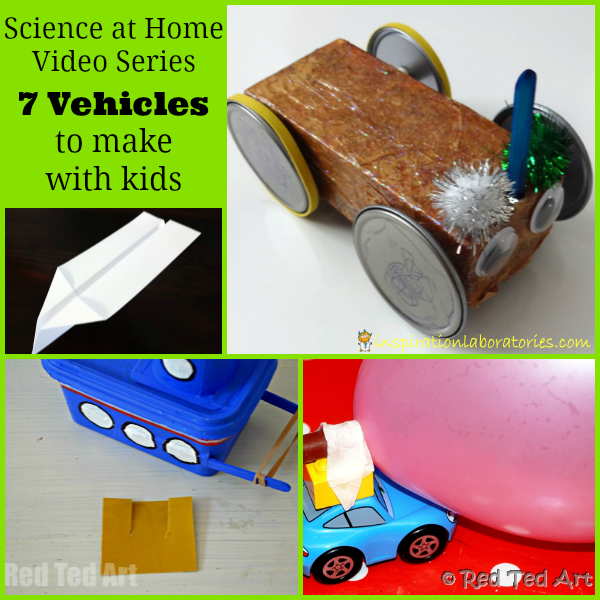Science at Home: Vehicles
Thanks for joining us for our next episode in our Science at Home video series. This time we are talking about vehicles – cars, boats, hovercrafts, planes, etc. – how you can make them with your kids and do science together.
Science at Home: Vehicles
Watch the video to see the vehicles we made.
1) I shared our rubber band powered car and the changes we had to make to get it to work.
2) Emma from Science Sparks talks about the challenges of making a cotton reel car – what she had to do to get it to work plus improvements she would like to make. Get the instructions for making your own cotton reel car.
3) Cerys from Rainy Day Mum tries out different designs of paper airplanes. There’s so many experiment possibilities with this one, and it’s great for even the youngest scientists!
4) Anthea from Blue Bear Wood explains how she made weight propelled cars. Lots of great physics concepts at work here and so much fun.
5) Maggy from Life at the Zoo and Red Ted Art shows off two vehicles – a balloon powered car and a self-propelled tug boat. Learn how to add power to any toy car you have in this balloon powered car post {complete with video}. You could always create the car, too. Maggy shows you how to build the tug boat craft and talks about the tug boat science.
6) Bonus vehicle {not in the video}: Learn how to make your own hovercraft.
As we talked about in the video, we really challenged ourselves with this one. Many of our vehicles didn’t work out as originally planned. We had to determine what was going on, make adjustments, and try again. I think this is a great lesson for science and life in general. Keep testing and experimenting. Keep trying. You and your kids learn just as much {if not more} from failures and redos than from things that work perfectly. It’s great to model this for young children. That way when they are older, they are more likely to have a keep going/try again attitude.
More Science Ideas
If you enjoy the Science at Home series, you may also enjoy the following:
- Build a bridge and see how much weight it can hold.
- Try this simple gravity experiment.
- Check out this list of science experiments perfect for toddlers and preschoolers.
- Join the Science for Kids Community on Google+. Share your hands-on science activities and be inspired by others.
Linking up here.




Leave a Reply